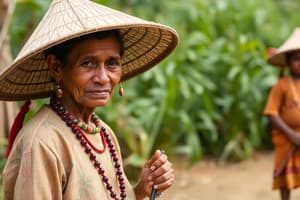Podcast
Questions and Answers
What is social science?
What is social science?
The study of people, their behaviors and interactions with each other with their built technological and natural advancements and seeks to understand the evolving human systems across our increasingly complex world.
What is anthropology?
What is anthropology?
The study of what makes us human, focusing on understanding both our shared humanity and diversity, and engaging with diverse ways of being in this world.
What are the subfields of anthropology?
What are the subfields of anthropology?
Archaeology (fossils & artifacts), Biological Anthropology (evolution of humans), Linguistics (language), Social/Cultural Anthropology (traditions & customs)
According to Edward Tylor, what is culture?
According to Edward Tylor, what is culture?
What is Franz Boas' perspective in anthropology?
What is Franz Boas' perspective in anthropology?
Who introduced participant observation as a method of studying culture?
Who introduced participant observation as a method of studying culture?
What is Margaret Mead's perspective on anthropology?
What is Margaret Mead's perspective on anthropology?
What is the etymology of anthropology?
What is the etymology of anthropology?
What is the etymology of sociology?
What is the etymology of sociology?
Who is considered the father of sociology?
Who is considered the father of sociology?
What is Harriet Martineau's perspective on sociology?
What is Harriet Martineau's perspective on sociology?
What is Emile Durkheim's perspective on sociology?
What is Emile Durkheim's perspective on sociology?
What are the 5 major social institutions?
What are the 5 major social institutions?
What is Karl Marx's perspective on sociology?
What is Karl Marx's perspective on sociology?
What is the etymology of political science?
What is the etymology of political science?
What does political science aim to know?
What does political science aim to know?
According to David Easton, what is Political Science concerned with?
According to David Easton, what is Political Science concerned with?
What are 'demands' in a political system?
What are 'demands' in a political system?
What is 'support' in a political system?
What is 'support' in a political system?
What is 'feedback' in a political system?
What is 'feedback' in a political system?
What are the inputs of a political system?
What are the inputs of a political system?
What is culture?
What is culture?
What is society?
What is society?
Culture is __________ that a person learns as a member of society
Culture is __________ that a person learns as a member of society
What is material culture?
What is material culture?
Culture is ________, it is taught by someone to someone else
Culture is ________, it is taught by someone to someone else
Culture is _________, it is an attribute not of individuals per se but of ___________________
Culture is _________, it is an attribute not of individuals per se but of ___________________
Culture is __________, it originated when our ancestors acquired the ability to use __________ to originate and bestow meaning on a thing or event
Culture is __________, it originated when our ancestors acquired the ability to use __________ to originate and bestow meaning on a thing or event
Why is culture adaptive?
Why is culture adaptive?
Why is culture dynamic?
Why is culture dynamic?
Why is culture contested?
Why is culture contested?
What is gender?
What is gender?
What is ethnicity?
What is ethnicity?
What do Class/Status refer to?
What do Class/Status refer to?
What does age refer to?
What does age refer to?
What are cultural variations?
What are cultural variations?
What are significant reasons of cultural variations?
What are significant reasons of cultural variations?
How does environment influence cultural variations?
How does environment influence cultural variations?
How does isolation influence cultural variations?
How does isolation influence cultural variations?
Flashcards
Social Science
Social Science
The study of people, their behaviors, interactions, and advancements in a complex world.
Anthropology
Anthropology
The study of what makes us human, exploring shared humanity and diversity.
Subfields of Anthropology
Subfields of Anthropology
Archaeology, Biological Anthropology, Linguistics, and Social/Cultural Anthropology
Edward Tylor's View
Edward Tylor's View
Signup and view all the flashcards
Franz Boas' Perspective
Franz Boas' Perspective
Signup and view all the flashcards
Bronislaw Malinowski
Bronislaw Malinowski
Signup and view all the flashcards
Margaret Mead's Perspective
Margaret Mead's Perspective
Signup and view all the flashcards
Anthropology Etymology
Anthropology Etymology
Signup and view all the flashcards
Sociology Etymology
Sociology Etymology
Signup and view all the flashcards
Auguste Comte
Auguste Comte
Signup and view all the flashcards
Harriet Martineau's View
Harriet Martineau's View
Signup and view all the flashcards
Emile Durkheim's View
Emile Durkheim's View
Signup and view all the flashcards
Major Social Institutions
Major Social Institutions
Signup and view all the flashcards
Karl Marx's Perspective
Karl Marx's Perspective
Signup and view all the flashcards
Political Science Etymology
Political Science Etymology
Signup and view all the flashcards
Political Science Definition
Political Science Definition
Signup and view all the flashcards
David Easton's View
David Easton's View
Signup and view all the flashcards
Demands Defined
Demands Defined
Signup and view all the flashcards
Support Defined
Support Defined
Signup and view all the flashcards
Feedback Defined
Feedback Defined
Signup and view all the flashcards
Inputs of Political System
Inputs of Political System
Signup and view all the flashcards
Outputs of Political System
Outputs of Political System
Signup and view all the flashcards
Culture Defined
Culture Defined
Signup and view all the flashcards
Society Defined
Society Defined
Signup and view all the flashcards
Extent of Culture
Extent of Culture
Signup and view all the flashcards
Material Culture
Material Culture
Signup and view all the flashcards
Nonmaterial Culture
Nonmaterial Culture
Signup and view all the flashcards
Nature of Culture
Nature of Culture
Signup and view all the flashcards
How Culture Works
How Culture Works
Signup and view all the flashcards
How Culture Originated
How Culture Originated
Signup and view all the flashcards
Study Notes
- Social Science studies people, their behaviors, and interactions with each other, including technological and natural advancements.
- Social Science seeks to understand evolving human systems in an increasingly complex world.
Anthropology
- Anthropology is the study of what makes us human.
- Anthropology focuses on understanding both our shared humanity and diversity.
- Anthropology engages with diverse ways of being in this world.
- The subfields of anthropology are Archaeology (fossils & artifacts), Biological Anthropology (evolution of humans), Linguistics (language), and Social/Cultural Anthropology (traditions & customs).
- Edward Tylor's perspective is that culture is a complex whole, including knowledge, belief, arts, morals, law, customs, and other capabilities and habits acquired by people.
- Franz Boas believed a stratification of society in social groups that are racial in character will always lead to racial discrimination.
- Franz Boas believed each culture is unique and must be studied in its own context.
- Bronislaw Malinowski introduced participant observation as a method of studying culture.
- Margaret Mead stated culture shapes human behavior, particularly in relation to gender roles.
- Margaret Mead believed gender roles could be redefined and reshaped through cultural change.
- The etymology of anthropology: "anthropos" (human) + "logos" (study) = study of humanity.
Sociology
- The etymology of sociology: "socius" (companionship) + "logos" (study) = study of companionship/society
- Auguste Comte is the father of sociology.
- Auguste Comte introduced a positivist approach in studying society.
- Auguste Comte believed society must be studied scientifically through evidence, experiments, and statistics.
- Harriet Martineau emphasized the need for sociologists to adopt an attitude of empathy and understanding toward those they were observing.
- Emile Durkheim viewed society as a living organism, in which organs (social institutions) play a role in keeping society alive.
- Emile Durkheim emphasized the elements of cohesion, shared values, and social equilibrium as bases of social order
- The 5 major social institutions: Family, Education, Religion, Economy, Government.
- Karl Marx stated society is shaped by the interest of powerful & dominant groups.
- Karl Marx emphasized the antagonisms of opposing classes in order to control the distribution of scarce resources.
Political Science
- The etymology of political science: "polis" (city/state) + "scire" (to know) = study of politics, power, government
- Political Science aims to know the activities within the state.
- Political Science studies human interactions and conflict, human and state relations, and power distribution.
- David Easton was concerned with how authoritative decisions are made and executed by a society.
- Demands are perceived needs by a population.
- Support refers to mechanisms within the system that would allow for such demands to be facilitated.
- Feedback refers to opinions & responses that would be made by affected sectors.
- The inputs of a political system are demands & support.
- The outputs of a political system are decisions & policies.
Culture
- Culture consists of socially transmitted ways of thinking, believing, feeling, and acting within a group of people.
- Society is a group of people who share a defined territory and culture.
- Culture is everything that a person learns as a member of society.
- Material culture consists of concrete and tangible objects created and used by humans.
- Examples of material culture: dwelling places, weapons, tools, clothing, artifacts.
- Nonmaterial culture includes all of the abstract and intangible parts of culture.
- Examples of nonmaterial culture: behavior, knowledge, customs, traditions, beliefs.
- Culture is learned; it is taught by someone to someone else.
- Culture is shared, it is an attribute not of individuals per se but of individuals as members of groups.
- Culture is symbolic, it originated when our ancestors acquired the ability to use symbols to originate and bestow meaning on a thing or event.
- Culture is adaptive and is a tool for survival that humans use in response to the pressures of the environment.
- Culture is influenced by the goal of humans to address their needs.
- Culture is dynamic; change happens all the time and nothing is permanent except change.
- Culture is contested; contesting of such issues is important to voice concerns and fight for what they believe is right.
Social Constructs
- Sex is biological differences between males and females.
- Sex determines physiological characteristics and can influence societal roles and expectations.
- Gender consists of socially constructed roles, behaviors, and attributes considered appropriate for men and women.
- Gender influences personal identity, social expectations, and interactions.
- Race is a social construct based on physical characteristics such as skin color, facial features, and hair texture.
- Race influences identity, social experiences, and access to resources.
- Ethnicity refers to shared cultural practices, traditions, and heritage, including language, religion, and customs.
- Ethnicity shapes cultural identity and community belonging, influencing social interactions and personal experiences.
- Class/status refers to social stratification based on economic resources, education, and occupation.
- Class/status affects individuals' access to opportunities, social mobility, and lifestyle.
- Age refers to the stage of life a person is in, from infancy to old age.
- Age affects social roles, expectations, and experiences.
- Cultural Variations refer to the differences in customs, beliefs, practices, and behaviors that exist between different cultures or within subgroups of the same culture.
- Cultural Variations are shaped by factors such as geography, history, religion, language, and social norms.
- Cultural variations manifest in many aspects of life including communication styles, traditions, values, and social practices.
- Significant reasons of cultural variations are environment, isolation, and technology.
Reasons For Cultural Variations
- The natural surroundings, including climate and resources, shape daily life, customs, and practices.
- Coastal cultures may develop fishing-based traditions, while desert cultures focus on water conservation.
- Isolation leads to the development of unique cultural practices by limiting interaction with other groups.
- Isolation helps in preserving cultural practices that might otherwise be influenced or diluted by outside contact.
- Remote tribes maintain traditional ways of life due to limited outside contact.
Studying That Suits You
Use AI to generate personalized quizzes and flashcards to suit your learning preferences.




